初一上英语Unit 7-12导学案
- 格式:doc
- 大小:374.00 KB
- 文档页数:50
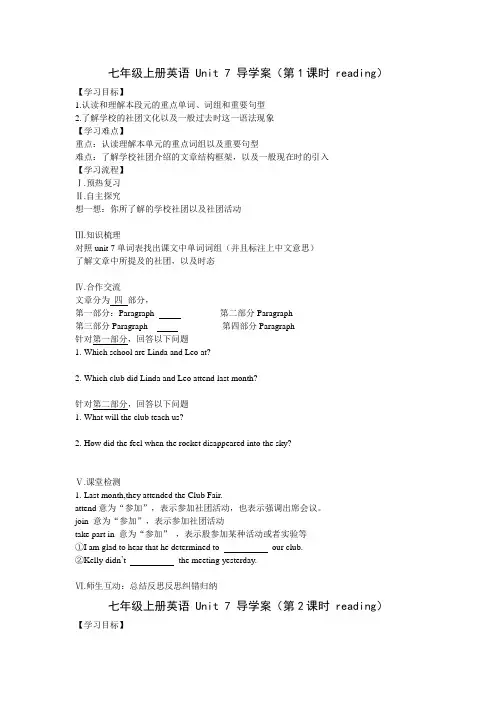
七年级上册英语 Unit 7 导学案(第 1 课时 reading)【学习目标】 1.认读和理解本段元的重点单词、词组和重要句型 2.了解学校的社团文化以及一般过去时这一语法现象 【学习难点】 重点:认读理解本单元的重点词组以及重要句型 难点:了解学校社团介绍的文章结构框架,以及一般现在时的引入 【学习流程】 Ⅰ.预热复习 Ⅱ.自主探究 想一想:你所了解的学校社团以及社团活动 Ⅲ.知识梳理 对照 unit 7 单词表找出课文中单词词组(并且标注上中文意思) 了解文章中所提及的社团,以及时态 Ⅳ.合作交流 文章分为 四 部分, 第一部分:Paragraph 第三部分 Paragraph 针对第一部分,回答以下问题 1. Which school are Linda and Leo at?第二部分 Paragraph 第四部分 Paragraph2. Which club did Linda and Leo attend last month? 针对第二部分,回答以下问题 1. What will the club teach us? 2. How did the feel when the rocket disappeared into the sky?Ⅴ.课堂检测 1. Last month,they attended the Club Fair. attend 意为“参加”,表示参加社团活动,也表示强调出席会议。
join 意为“参加”,表示参加社团活动 take part in 意为“参加” ,表示股参加某种活动或者实验等 ①I am glad to hear that he determined to our club. ②Kelly didn’t the meeting yesterday. Ⅵ.师生互动:总结反思反思纠错归纳七年级上册英语 Unit 7 导学案(第 2 课时 reading)【学习目标】1.掌握并学会准确适用本单元的重点单词和短语 2.掌握并雪狐准确适用本段元 reading 部分涉及的重要句型 【学习难点】 重点:熟悉本单元的词组运用,并运用到写作训练与习题练习中 难点:易混淆词组的辨析运用 【学习流程】 Ⅰ.预热复习 1.fair 2.rocket 3.power 4.solar power 5.skill rmation 7.butterfly 8.bee 9. recent Ⅱ.自主探究 Review what have learned in paragraph 1 to paragraph 5? 针对第三部分,回答以下问题 1. What they use to drive the toy car around the playground? 2. How does Linda think of it? 针对第四部分,回答以下问题 1. After the fair, how do Linda and Leo feel? 2. Which club does Linda want to join ?Ⅲ.合作交流 1. “ Of course, it won’t”, a girl form another clubs shouted. “Our club is better. Come and join the Solar Power Club. ” another:意为“另一个(事物或者人)”表示两者之中的另一个 other:意为“另一个(事物或者人)”,表示三者以及三者以上的另一个 ①There are many students on the playground. And students are in the classroom. ②There are two apples on the desk. The one is for Xiaoming. And one is for Xiaoli. 2. That’s amazing! amazing :(某事或某物)令人感到大为惊奇的 adj. amazed:(某人对某物或或某物)感到惊奇的 adj. amaze: 惊奇 n. 惊奇 v. 同理: surprising: boring: surprised: bored : surprise: bore: Ⅳ.师生互动:总结反思七年级上册英语 Unit 7 导学案(第 3 课时 grammar)【学习目标】 1. 掌握动词过去式的语法规则:规则动词以及不规则动词2. 掌握一般过去时的句子结构(主要体现为动词的变化) 3. 一般过去时在习题中的运用 【学习难点】 动词过去式的语法规则:规则动词以及不规则动词 【学习流程】 Ⅰ.预热复习 回顾一般现在时中的动词的体现变化 ①I have a book. ②He has a book. ③She is a girl. ④They are students Ⅱ.自主探究 什么叫做一般过去时?通过什么的变化来体现时态的变化呢?请观察一下句子分析: ①She had a book. ②They were students. ③I loved history. 一般过去时: 一般过去时表示过去某个时间里发生的动作, 也表示过去经常或反复发生的动 作,一般过去时不需考虑第三人称单数的变化。
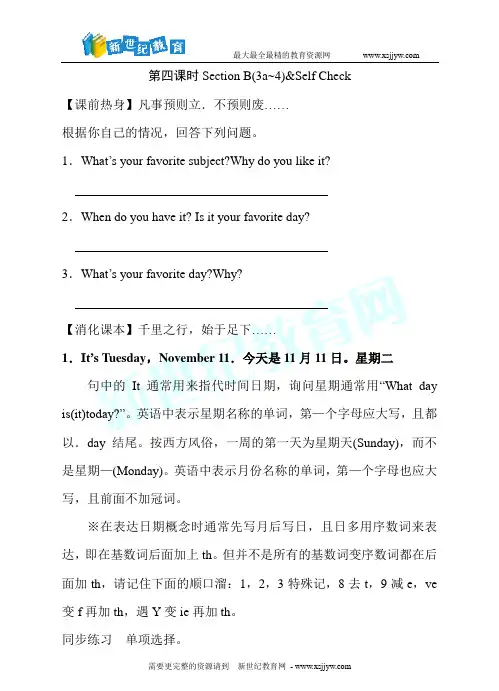
第四课时Section B(3a~4)&Self Check【课前热身】凡事预则立.不预则废……根据你自己的情况,回答下列问题。
1.What’s your favorite subject?Why do you like it?2.When do you have it? Is it your favorite day?3.Wh at’s your favorite day?Why?【消化课本】千里之行,始于足下……1.It’s Tuesday,November 11.今天是11月11日。
星期二句中的It通常用来指代时间日期,询问星期通常用“What day is(it)today?”。
英语中表示星期名称的单词,第—个字母应大写,且都以.day结尾。
按西方风俗,一周的第一天为星期天(Sunday),而不是星期—(Monday)。
英语中表示月份名称的单词,第—个字母也应大写,且前面不加冠词。
※在表达日期概念时通常先写月后写日,且日多用序数词来表达,即在基数词后面加上th。
但并不是所有的基数词变序数词都在后面加th,请记住下面的顺口溜:1,2,3特殊记,8去t,9减e,ve 变f再加th,遇Y变ie再加th。
同步练习单项选择。
( )1.—What day is today?—Monday.A.That’s B.It’sC.This is D.He’s( )2.Wednesday is the day of the week.A.third B.fifthC.sixth D.fourth( )3.—?—It’s Thursday.A.What’s the timeB.What day is todayC.Is it MondayD.What’s the date2.After class I have volleyball for two hours.课后我打两个小时的排球。
(1)after class课后。
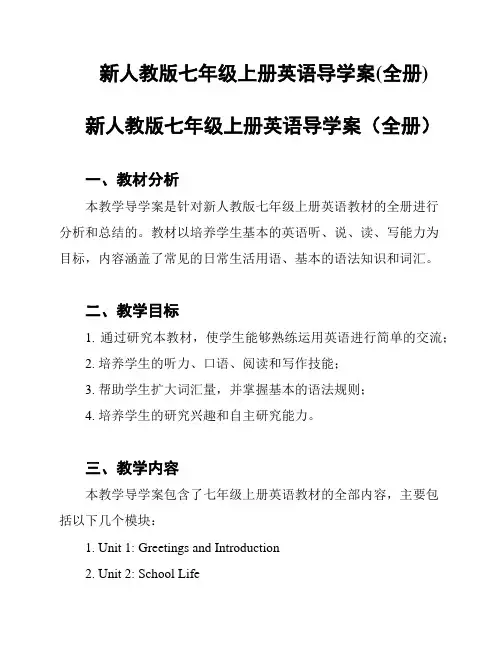
新人教版七年级上册英语导学案(全册)新人教版七年级上册英语导学案(全册)一、教材分析本教学导学案是针对新人教版七年级上册英语教材的全册进行分析和总结的。
教材以培养学生基本的英语听、说、读、写能力为目标,内容涵盖了常见的日常生活用语、基本的语法知识和词汇。
二、教学目标1. 通过研究本教材,使学生能够熟练运用英语进行简单的交流;2. 培养学生的听力、口语、阅读和写作技能;3. 帮助学生扩大词汇量,并掌握基本的语法规则;4. 培养学生的研究兴趣和自主研究能力。
三、教学内容本教学导学案包含了七年级上册英语教材的全部内容,主要包括以下几个模块:1. Unit 1: Greetings and Introduction2. Unit 2: School Life3. Unit 3: Family4. Unit 4: Hobbies5. Unit 5: Food and Drinks6. Unit 6: At the Weekend7. Unit 7: Shopping8. Unit 8: Holidays四、教学方法为了达到预期的教学目标,我们将采用以下几种教学方法:1. 听力训练:通过听力练,提高学生对英语语音和语调的敏感度;2. 口语练:通过角色扮演、对话练等活动,提高学生的口语表达能力;3. 阅读理解:通过阅读文章、理解问题和回答问题的练,培养学生的阅读理解能力;4. 写作训练:通过写作练,提高学生的写作水平和表达能力;5. 词汇拓展:通过词汇练,帮助学生扩大词汇量。
五、教学评估为了了解学生的研究情况并及时调整教学策略,我们将进行定期的教学评估。
评估方式包括口语测试、阅读测试和书面作业。
同时,我们将鼓励学生积极参与课堂活动并提供及时的反馈和指导。
六、教学资源为了支持教学的开展,我们将充分利用以下教学资源:1. 教科书:新人教版七年级上册英语教材;2. 多媒体设备:投影仪、电脑等;3. 教学软件和网站:提供课堂练和辅助教学资料;4. 研究资料和练册:辅助教材和练资料,帮助学生巩固所学知识。
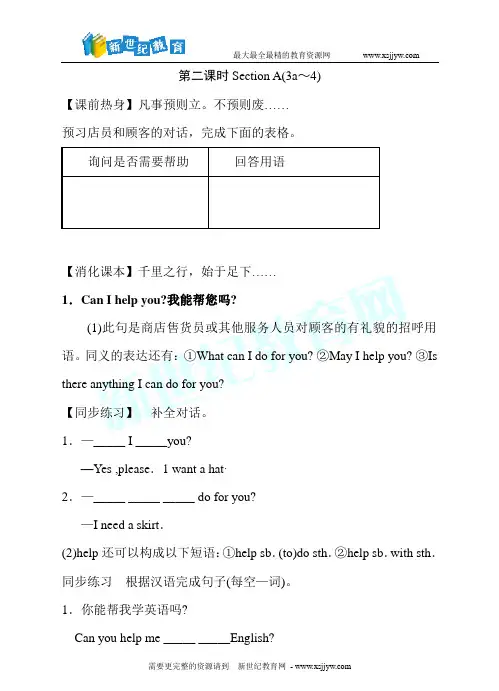
第二课时Section A(3a~4)【课前热身】凡事预则立。
不预则废……预习店员和顾客的对话,完成下面的表格。
【消化课本】千里之行,始于足下……1.Can I help you?我能帮您吗?(1)此句是商店售货员或其他服务人员对顾客的有礼貌的招呼用语。
同义的表达还有:①What can I do for you? ②May I help you? ③Is there anything I can do for you?【同步练习】补全对话。
1.—_____ I _____you?—Yes ,please.1 want a hat·2.—_____ _____ _____ do for you?—I need a skirt.(2)help还可以构成以下短语:①help sb.(to)do sth.②help sb.with sth.同步练习根据汉语完成句子(每空—词)。
1.你能帮我学英语吗?Can you help me _____ English?Can you help me _____ my English?2.I'll take it.我要买它。
句子中take的意思是“买”。
同步练习把下面的句子译成英语。
1.我喜欢这件蓝色的毛衣。
我要买下它。
_____________________________________________________ 3.You’re welcome.不用谢。
在表达感谢时,我们可以使用:①Thank you.Very much.②Thanks a lot.③Thank you for your help.在别人对你表示感谢时,常用You’re welcome应答,表示“不用谢”。
也可以使用:①That’s all right.②My pleasure.③It’s my pleasure.同步练习单项选择。
( )1.—Thank you very much.—_____.A.You’re welcomeB.That’s rightC.OK【课后练习】架设课内课外的桥梁……Ⅰ.汉译英。
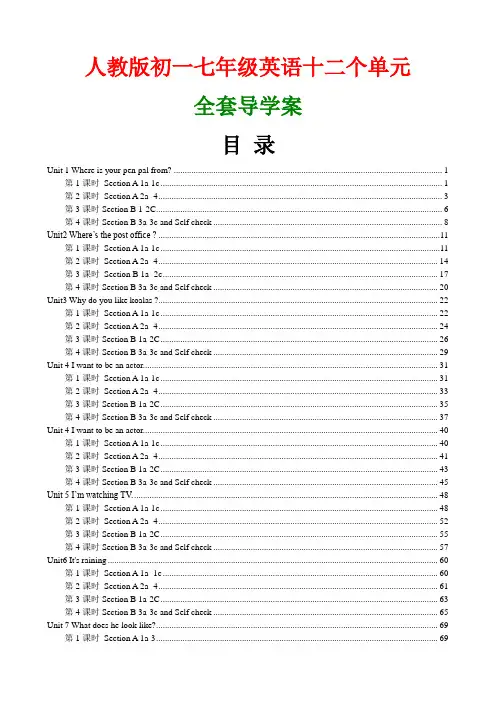
人教版初一七年级英语十二个单元全套导学案目录Unit 1 Where is your pen pal from? (1)第1课时Section A 1a-1c (1)第2课时Section A 2a -4 (3)第3课时Section B 1-2C (6)第4课时Section B 3a-3c and Self check (8)Unit2 Where’s the post office ? (11)第1课时Section A 1a-1c (11)第2课时Section A 2a -4 (14)第3课时Section B 1a -2c (17)第4课时Section B 3a-3c and Self check (20)Unit3 Why do you like koalas ? (22)第1课时Section A 1a-1c (22)第2课时Section A 2a -4 (24)第3课时Section B 1a-2C (26)第4课时Section B 3a-3c and Self check (29)Unit 4 I want to be an actor. (31)第1课时Section A 1a-1c (31)第2课时Section A 2a -4 (33)第3课时Section B 1a-2C (35)第4课时Section B 3a-3c and Self check (37)Unit 4 I want to be an actor. (40)第1课时Section A 1a-1c (40)第2课时Section A 2a -4 (41)第3课时Section B 1a-2C (43)第4课时Section B 3a-3c and Self check (45)Unit 5 I’m watching TV (48)第1课时Section A 1a-1c (48)第2课时Section A 2a -4 (52)第3课时Section B 1a-2C (55)第4课时Section B 3a-3c and Self check (57)Unit6 It's raining (60)第1课时Section A 1a -1c (60)第2课时Section A 2a -4 (61)第3课时Section B 1a-2C (63)第4课时Section B 3a-3c and Self check (65)Unit 7 What does he look like? (69)第1课时Section A 1a-3 (69)第2课时Section A 3a -4 (72)第3课时Section B 1a-2C (76)第4课时Section B 3a-3c and Self check (78)Unit 8 I’d like some noodles (83)第1课时Section A 1a-1c (83)第2课时Sectiona A 2a-4 (85)第3课时Section B 1a-2c (88)第4课时Section B 3a-4 and Self check (92)Unit9 How was your weekends? (97)第1课时Section A 1a-1c (97)第2课时Section A 2a -4 (99)第3课时Section B 1a-2C and Shelf check-3 (102)第4课时Section B 3a-3c (105)Unit 10 Where did you go on vacation? (109)第1课时Section A 1a-1c (109)第2课时Section A 3a -4 (112)第3课时Section B 1a-2C (113)第4课时Section B 3a-3c and Self check (116)Unit 11 What do you think of game shows? (119)第1课时Section A 1a-2c (119)第2课时Section A 3a -4 (123)第3课时Section B 1a-2C (125)第4课时Section B 3a-3c and Self check (128)Unit 12 Don't eat in class. (133)第1课时Section A 1a-1c (133)第2课时Section A 2a -4 (135)第3课时Section B 1a-2C (140)第4课时Section B 3a-3c and Self check (141)七年级英语下册第一单元学案Unit 1 Where is your pen pal from?第1课时Section A 1a-1c【学习目标】1. 掌握P 1 单词2.掌握句型:—Where is your pen pal from? —He is from Australia.3.掌握世界上一些国家的英文名称及地理位置。
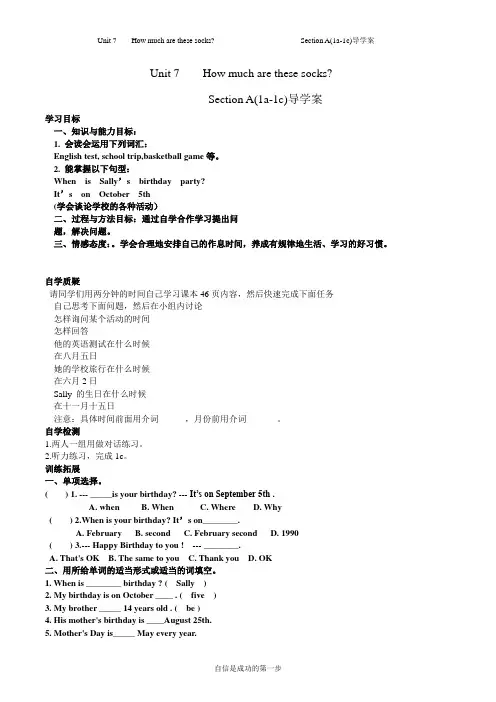
Unit 7 How much are these socks?Section A(1a-1c)导学案学习目标一、知识与能力目标:1. 会读会运用下列词汇:English test, school trip,basketball game等。
2. 能掌握以下句型:When is Sally’s birthday party?It’s on October 5th(学会谈论学校的各种活动)二、过程与方法目标:通过自学合作学习提出问题,解决问题。
三、情感态度:。
学会合理地安排自己的作息时间,养成有规律地生活、学习的好习惯。
自学质疑请同学们用两分钟的时间自己学习课本46页内容,然后快速完成下面任务自己思考下面问题,然后在小组内讨论怎样询问某个活动的时间____________________________怎样回答__________________________他的英语测试在什么时候____________________在八月五日__________________她的学校旅行在什么时候__________________________在六月2日______________________________Sally 的生日在什么时候__________________________在十一月十五日___________________________注意:具体时间前面用介词______,月份前用介词_______。
自学检测1.两人一组用做对话练习。
2.听力练习,完成1c。
训练拓展一、单项选择。
( ) 1. --- _____is your birthday? --- It’s on September 5th .A. whenB. WhenC. WhereD. Why( ) 2.When is your birthday? It’s on________.A. FebruaryB. secondC. February secondD. 1990( ) 3.--- Happy Birthday to you ! --- ________.A. That's OKB. The same to youC. Thank youD. OK二、用所给单词的适当形式或适当的词填空。
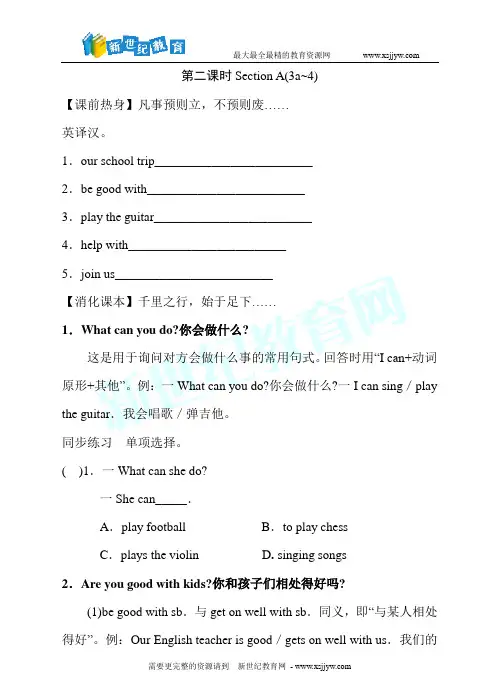
第二课时Section A(3a~4)【课前热身】凡事预则立,不预则废……英译汉。
1.our school trip_________________________2.be good with_________________________3.play the guitar_________________________4.help with_________________________5.join us_________________________【消化课本】千里之行,始于足下……1.What can you do?你会做什么?这是用于询问对方会做什么事的常用句式。
回答时用“I can+动词原形+其他”。
例:一What can you do?你会做什么?一I can sing/play the guitar.我会唱歌/弹吉他。
同步练习单项选择。
( )1.一What can she do?一She can_____.A.play football B.to play chessC.plays the violin D. singing songs2.Are you good with kids?你和孩子们相处得好吗?(1)be good with sb.与get on well with sb.同义,即“与某人相处得好”。
例:Our English teacher is good/gets on well with us.我们的英语老师与我们相处得很好。
(2)kid是可数名词,意为“孩子”,相当于child。
kid的复数形式为kids,child的复数形式为children。
例:They have two kids/children.他们有两个孩子。
同步练习根据句意及首字母拼写单词。
1.Are they good with these k ?2.Kids means c in English.3.Please be good w our students.3. We need help for our Beidaihe School Trip.我们学校的北戴河之旅需要帮助。
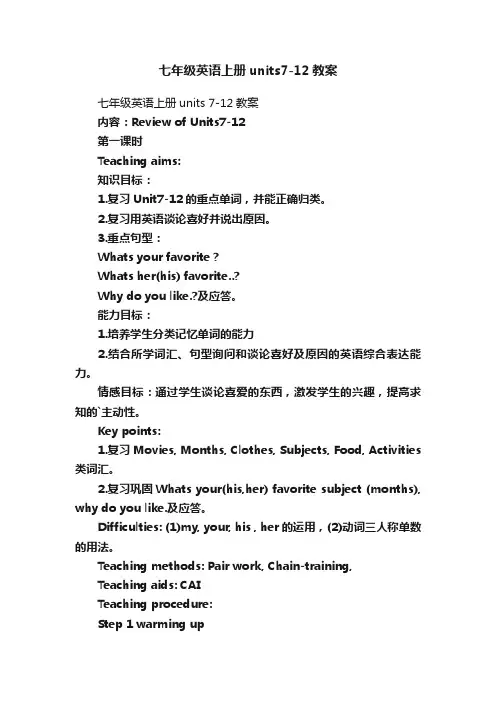
七年级英语上册units7-12教案七年级英语上册units 7-12教案内容:Review of Units7-12第一课时Teaching aims:知识目标:1.复习Unit7-12的重点单词,并能正确归类。
2.复习用英语谈论喜好并说出原因。
3.重点句型:Whats your favorite ?Whats her(his) favorite..?Why do you like.?及应答。
能力目标:1.培养学生分类记忆单词的能力2.结合所学词汇、句型询问和谈论喜好及原因的英语综合表达能力。
情感目标:通过学生谈论喜爱的东西,激发学生的兴趣,提高求知的`主动性。
Key points:1.复习Movies, Months, Clothes, Subjects, Food, Activities 类词汇。
2.复习巩固Whats your(his,her) favorite subject (months), why do you like.及应答。
Difficulties: (1)my, your, his , her的运用,(2)动词三人称单数的用法。
Teaching methods: Pair work, Chain-training,Teaching aids: CAITeaching procedure:Step 1 warming upT: Good morning , everyone. Lets enjoy a song first. Its a nice song , right . lets read the song .Ss sing the song together.。
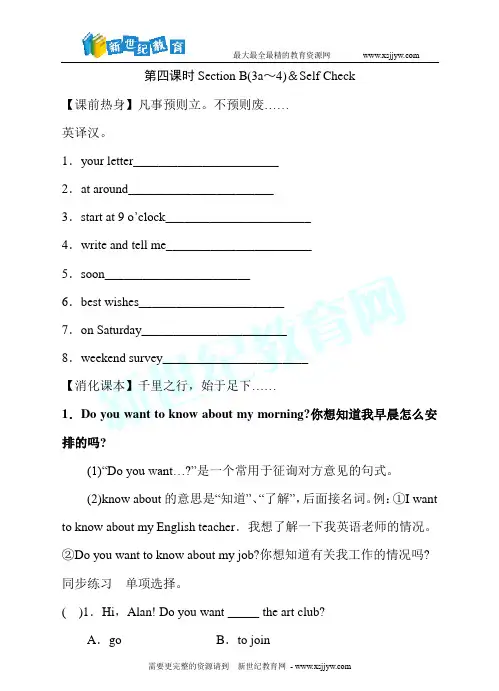
第四课时Section B(3a~4)&Self Check【课前热身】凡事预则立。
不预则废……英译汉。
1.your letter_______________________2.at around_______________________3.start at 9 o’clock_______________________4.write and tell me_______________________5.soon_______________________6.best wishes_______________________7.on Saturday_______________________8.weekend survey_______________________【消化课本】千里之行,始于足下……1.Do you want to know about my morning?你想知道我早晨怎么安排的吗?(1)“Do you want…?”是一个常用于征询对方意见的句式。
(2)know about的意思是“知道”、“了解”,后面接名词。
例:①I want to know about my English teacher.我想了解一下我英语老师的情况。
②Do you want to know about my job?你想知道有关我工作的情况吗? 同步练习单项选择。
( )1.Hi,Alan! Do you want _____ the art club?A.go B.to joinC.to be D.to take( )2.His teacher wants to _____ about his family.A.know B.get C.see D.speak2.I usually get up at around six-fifteen.我通常六点十五分起床。
此处around是副词,意为“大约”,常用在数字之前,相当于about。
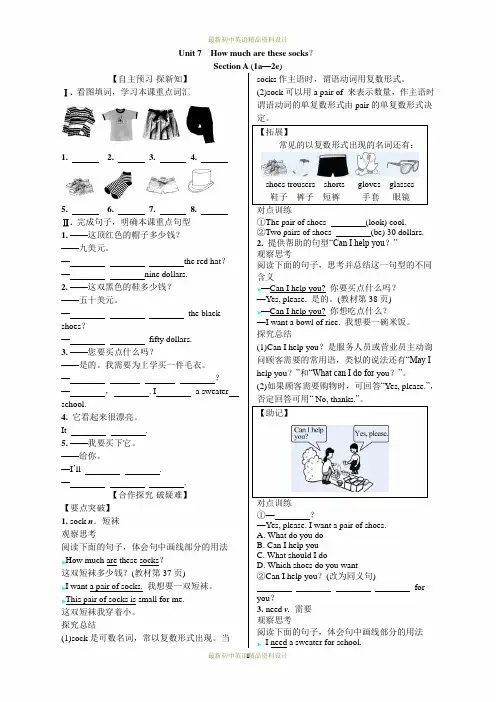
Unit 7How much are these socks?Section A (1a—2e)【自主预习·探新知】Ⅰ. 看图填词,学习本课重点词汇1. 2. 3. 4.5. 6.7.8.Ⅱ. 完成句子,明确本课重点句型1.——这顶红色的帽子多少钱?——九美元。
—the red hat?—nine dollars. 2.——这双黑色的鞋多少钱?——五十美元。
—the black shoes?—fifty dollars. 3.——您要买点什么吗?——是的。
我需要为上学买一件毛衣。
—?—,. I a sweater school.4.它看起来很漂亮。
It .5.——我要买下它。
——给你。
—I’ll .—.【合作探究·破疑难】【要点突破】1. sock n.短袜观察思考阅读下面的句子,体会句中画线部分的用法How much are these socks?这双短袜多少钱?(教材第37页)I want a pair of socks. 我想要一双短袜。
This pair of socks is small for me.这双短袜我穿着小。
探究总结(1)sock是可数名词,常以复数形式出现。
当socks作主语时,谓语动词用复数形式。
(2)sock可以用a pair of 来表示数量,作主语时谓语动词的单复数形式由pair的单复数形式决定。
【拓展】常见的以复数形式出现的名词还有:shoes trousers shorts gloves glasses鞋子裤子短裤手套眼镜对点训练①The pair of shoes (look) cool.②Two pairs of shoes (be) 30 dollars.2.提供帮助的句型“Can I help you?”观察思考阅读下面的句子,思考并总结这一句型的不同含义—Can I help you? 你要买点什么吗?—Yes, please. 是的。
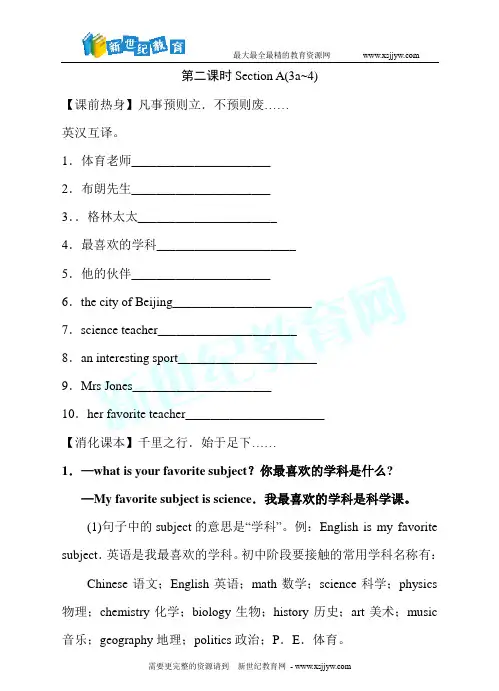
第二课时Section A(3a~4)【课前热身】凡事预则立.不预则废……英汉互译。
1.体育老师______________________2.布朗先生______________________3..格林太太______________________4.最喜欢的学科______________________5.他的伙伴______________________6.the city of Beijing______________________7.science teacher______________________8.an interesting sport______________________9.Mrs Jones______________________10.her favorite teacher______________________【消化课本】千里之行.始于足下……1.—what is your favorite subject?你最喜欢的学科是什么?—My favorite subject is science.我最喜欢的学科是科学课。
(1)句子中的subject的意思是“学科”。
例:English is my favorite subject.英语是我最喜欢的学科。
初中阶段要接触的常用学科名称有:Chinese语文;English英语;math数学;science科学;physics 物理;chemistry化学;biology生物;history历史;art美术;music 音乐;geography地理;politics政治;P.E.体育。
(2)句子中的your和my都是物主代词,要注意它们和代词主格的区分以及使用。
相类似的还有his(他的)、her(她的)、their(他们的)、its(它的)等。
例:Her favorite teacher is Mr Wang,because he is so kind.她最喜欢的老师是王老师,因为他很善良。
第三课时Section B(1a~2c)【课前热身】凡事预则立.不预则废……个人自读,写出这些活动的时间并记忆词组。
【消化课本】千里之行,始于足下……1.When do people usually eat dinner?人们通常什么时候吃晚饭?(1)when是一个疑问副词,意为“什么时候”、“何时”,常用以引出一个特殊疑问句。
when可以对年、月、日以及时刻进行提问,也可以询问某一动作发生的时间,回答时常用介词at、in、on等组成的表时间的介词短语。
what time和when有时候可以通用。
但其区别在于前者问具体的时间,如某一天的几点钟,甚至几分钟,而when问的时间一般比较笼统。
因此在问生日日期时,不要用what time这个特殊疑问词,而应该用when。
同步练习选用when/what time填空。
1.一________does Tom take a shower?一He takes a shower at nine o’clock in the evenin g.2.一________do people usually eat breakfast?一People usually eat breakfast in the morning.(2)eat dinner相当于have supper。
dinner和supper都有晚饭的意思,但两者还是存在区别的:dinner是指大型的(中晚饭)正餐、主餐,而supper是指家常晚饭。
三餐饭的名词前都不用冠词。
例:①It’s time for dinner.该吃饭了。
②Let’s invite them to dinner tomorrow.我们明天请他们吃饭吧。
同步练习单项选择。
( )1.一When do they eat _____?—Usually in the evening.A.breakfast B.lunchC.meal D.supper( )2.They have _____dinner very late.A.the B./C.a D.an【课后练习】架设课内课外的桥梁……Ⅰ.汉译英。
Unit 7 How much are these socks?Period 1【学习目标】:1.掌握单词pants,sock,shirt,shorts,sweater,shoe,skirt,sale,dollar2.掌握询问价格的句型:How much is this T-shirt?/ It's seven dollars.How much are these socks?/They're two dollars.【学习重点】:学会使用询问价格的句型,并能正确回答【学习过程】:一、自主学习学习任务一: 熟练掌握本课的单词1.个人自读,记忆本课单词.2.小组互相检查单词读写情况.3.根据汉语写出下列英语单词并展示.裤子_____ 短袜______ 男衬衣______ T恤衫______短裤___ 毛衣______鞋________裙子________出售_______ 美元_____ (价钱)多少_______________ 学习任务二:学习1a ,掌握句型:How much is/are …? It’s They’re …1.自读单词,然后将单词与图中物品相搭配..2.小组核对答案.学习任务三:完成听说练习1.听录音,在图中圈出你听到的物品.2.练习听力对话.3.自读中的对话,理解汉语意思.4.小组讨论汉语意思,并练习对话.5.两人一组展示对话,小组竞争.6.利用身边的实物,两人一组练习对话二、群学翻译句子:---这个帽子多少钱?---五美元.____________________________ ?________________________.---这些袜子多少钱?---两美元.________________________________? ______________________.三、系统总结当我们询问物品的价格时,回答的时候需要注意什么?______________________________________________________.四、【当堂训练】(一)根据句意和首字母完成单词.1. The blue hat is seven d__________.2. How much _____ the pants?3. How much are the ______(短袜)? ______ ______ two dollars.4. My _________(毛衣) is red.5.—How m______ is your skirt? —20dollars.(二)单选题1. How much _______ these pants?A. isB. amC. areD. do2.—How much are the black socks?—__________________.A. It's 10 yuan.B. It's 10 yuans.C. They're 10 yuan.D. They're 10 yuans.3. Where ______ your new pants?________ on the bed.A . is, It's B. are, They'reC. is, They'reD. are,It's(三)根据汉语完成句子1.这条裤子多少钱?20美元.___________________________________? _________________________.2.这件衬衣多少钱? 8美元._____________________________________? ______________________.Unit 7 How much are these socks?Period 2【学习目标】:1. 掌握有关颜色和服装的单词.2.学会询问价格及购物用语..【学习重点】:购物用语的听说练习.【学习过程】:一、自主学习学习任务一: 熟练掌握本课的单词1.个人自读,记忆本课单词.2.小组互相检查单词读写情况.学习任务二:听说练习1.自读单词,用表示颜色和形状的形容词描述自己或者同学的衣服.2.两人一组谈论2b图片中的衣服3.听录音,在图中圈出你听到的物品.4.再听一遍,完成2c.5.听录音,并跟读,模仿语音语调6.两人一组就 2b中圈出的义务展示对话,如How much ...? It's .../They are...二、群学四人一组模拟一个买衣服的场景进行对话三、系统总结当我们询问物品的价格时,回答的时候需要注意什么?______________________________________________________.四、当堂训练(一)根据所给单词的首字母填空1. The blue hat is seven d___________.2. H______ much is the bag?3. —What c______ is your hat? — Blue.4. —Can I h_______ you? —Yes, please.5. You are w ___________.(二)翻译句子1.你的帽子多少钱? 3美元._____________________________________?_______________________.2.那个白色的书包多少钱? 12元。
七年级英语上册units 7-12复习教案七年级英语上册units7-12复习教案内容:ReviefUnits7-12第一时Teahingais:知识目标:1复习Unit7-12的重点单词,并能正确归类。
2复习用英语谈论喜好并说出原因。
3重点句型:hat’surfavrite……?hat’sherfavrite…?hdulie…?及应答。
能力目标:1培养学生分类记忆单词的能力2结合所学词汇、句型询问和谈论喜好及原因的英语综合表达能力。
情感目标:通过学生谈论喜爱的东西,激发学生的兴趣,提高求知的主动性。
epints:复习vies,nths,lthes,Subets,Fd,Ativities类词汇。
2复习巩固hat’surfavritesubet,hdulie…及应答。
Diffiulties:,ur,his,her的运用,(2)动词三人称单数的用法。
Teahingethds:Pairr,hain-training,Teahingaids:AITeahingpredure:Step1aringupT:Gdrning,everneLet’senasngfirstIt’saniesng,rightlet’sreadthesngSssingthesngtgetherStep2freetalandritetherdsT:Gd!uansinghatelseanud?hatlubduanttin?hduanttinthe…lub?GetSstasandanserliethis2T:uanttinthe…lubThenhat ‘surfavritesubet?hdulieit?h’sur…teaher?henduhave…?SsasandanserliethisandritethesubetsntheBb3T:ehave…n…hatdaisittda?hat’sthedatetda?henisurbirthda?hat’surfavritenth?SsasandanserliethisandritethenthsntheBb4T:hatdudnurbirthda?hatdpepleusualldintherning/afte rnn/evening?SsritetheativitiesntheBbT:henduusuallgetup/…?SsasandanserinpairsT:Pepleusuallgttheviesintheeveninghatindfviesdulie? hdulieit/the6T:Iusuallgtthelthesshpintheeveninghatanuseeinthelt hesshpHuhis/are…?Step3aesentenesandnversatinsiththerdsT:anuaesesentenesiththerds?SsstandupandsathesentenesT:IalsaesesentenesfruPleasereadtheandfillintheblansanuaenversatiniththerds?Pleasehsenetpiandaenversati nintallseveralpairstatuttheirnversatinsStep4ReadtheparagraphSsreadtheparagraphandfillintheblansiththerdsinthebx SsritednthequestinsabuttheparagraphGetthetasandanserthequestinsStepGaeT:enuhabutPaulBrnnDunurfriendsell?EvernehasafriendL et’splaagaehuhunurfriendStep6ritingT:ritesethingabuturfriend,letthersguesshhe/sheis Step7Her完成作业本。
⼈教新⽬标英语七年级上册Unit7全单元导学案(⽆答案)⼈教新⽬标英语七年级上册Unit 7 How much are these pants?师⽣备注第1课时Section A (1a—2e)【学习⽬标】:询问价格;谈论⾐物;提供帮助;感谢他⼈1. 知识⽬标:(请注明重点词汇、重点句型的汉语意思)掌握重点词汇:help want welcome examplebig small short long womanneed look pair take重点句型:⑴Can I help you? ⑵Yes, please.⑶What color do you want? ⑷Here you are.⑸I will take it. ⑹You’re welcome.【预习指导】:⼀、通过1a预习写出下列⾐物的英⽂名称。
T-恤衫袜⼦短裙鞋⼦包裤⼦帽⼦⽑⾐短裤美元⼆、英汉互译。
试着翻译下⾯的⼩对话。
(1)-How much is this T-shirt? _____________________________-It’s seven dollars. _____________________________(2)-这顶帽⼦多少钱?____________________________-5美元。
_____________________________(3)-How much are these T-shirts? ________-They are ten dollars. _____________________________(4)- 这些书多少钱?____________________________-20元。
_____________________________Explanation:1.how much⽤于提问某物的价格,意为“多少钱”,其句式为“+主语?”当主语是不可数名词或可数名词单数时,be动词⽤is,答语为It’s+数额;当主语是可数名词复数时,be动词⽤are,答语为They’re+数额。
第1页,共4页 第2页,共4页密考号密 封 线 内 不 得 答 题旧城初级中学导学案学科: English 课题: 七年级 Unit7 主备教师: 赵关乔备课组长: 赵关乔 教研组长: 赵关乔 审核结果:SectionA 1a —Grammar focus(自主学习目标)一、 导学目标:1.知识目标:◎通过学习由How much 引导的特殊疑问句从而学会用英语谈论服装的价格和颜色,对服装的喜好和购物时使用的礼貌用语等。
◎ 学会使用描述性的形容词来评价事物,表达感受。
2.能力目标: 能运用How much is/are ...? It’s/They are ...What color...? 等句型,谈论物品的价格和颜色,正确使用购物礼貌用语。
二.教学重难点:1.重点:学会运用重点句型 How much is/are ...? It ’s/They are...等,对服装的价格进行询问。
2.难点:使用How much 引导的问句及回答,进行口语交际活动。
(预习与交流)一,词汇及短语冲关1. sock 复数形式2. T-shirt3.shorts4. sweater 复数形式5.trousers6. shoe7.skirt 复数形式8. dollar9.big 10. long 11. short 12. small 13. How much 14. What color15. 服装店 16. 出售 17. 一条裤子 18. 九美元 19. 这些短袜 20. 给你 二,根据汉语意思完成下列句子。
1. 这两本字典多少钱?How much the two ?2. 你的包是什么颜色? is your bag?3. 你想买什么?Can ?4.你想要什么颜色的?What color ?5. 这件毛衣八美元。
This .6.我将买下它。
I will .(合作与探究)一,听听练练1. Listen and do 1b2a 听录音,完成1b.2a2. Listen and do2b —2c 听录音,完成2b —2c.3. 听对话,用所听到的单词填空。
Unit 8 When is your birthday?训练案(一)英汉互译1. 生日_________2. 月;月份_________3. 日期_________4. 愉快的_________5. 出生_________6. 年龄;年纪_________7. 年长的_________ 8. 演讲;讲演_________9. 竞争;竞赛_________ 10. 聚会;晚会_________11. 旅途_________ 12. 艺术;艺术品_________ 13. 节日_________ 14. 中文;中国人_________ 15. 音乐_________ 16. 年_________17. 第_________ 18. 第十二_________19. 一月;正月_________ 20. 二月_________21. 三月_________ 22,四月_________23. 五月_________ 24. 六月_________25. 七月_________ 26. 八月_________27. 九月_________ 28. 十月_________29. 十一月_________ 30. 十二月_________(二)单词运用1. 写出下列数词的序数词(1)one_________ (2)two_________(3)three_________ (4)five_________(5)eight_________ (6)nine_________(7)twelve_________ (8)nineteen_________ (9)twenty_________ (10)thirty-six_________ 2. 根据句意及汉语提示写出单词(1)_________ (一月)is the first month of the year. (2)My good friend's _________ (生日)is in June,(3)Teachers Day is _________ (九月)10 th.(4)We have an Art_________ (节日)each year.(5)Do you like _________ (音乐会)?(三)汉译英1. 出生日期_________2. 多大_________3. 篮球赛_________4. 学校旅行_________5. 演讲比赛_____6.生日晚会_________7. ……岁(年龄)_________ 8. 排球赛_________9. 艺术节_________ 10. 音乐节_________11. 在四月_________ 12. 英语晚会_________ 13. 十月一日_________(四)汉译英1. 他的生日与我的相同。
His _________is the same as mine.2. 你的父母年龄有多大?_________ _________ are your parents?3. 下周,我们学校有一次英语演讲比赛。
Next week,our school will have an_________ _________ _________. 4. 我们学校组织的学校旅行很有趣。
Our _________ _________ is very interesting。
5. 国庆节是十月一号。
National Day is_________ _________.(五)默写原句1. ——你的生日是什么时候?——是三月二十一。
___________________________________________________________________________ 2. ——你多大了?——15岁。
___________________________________________________________________________ 3. ——萨莉的生日晚会是什么时候?——是十月五号。
___________________________________________________________________________ 4. ——你们学校有校庆日吗?——有。
___________________________________________________________________________ (六)连词成句1. party,birthday,a,for,we,him,have(. )___________________________________________________________________________ 2. do,have,when,contest,English,you,an(?)___________________________________________________________________________ 3. month,year,the,the,of,third,March,is(. )___________________________________________________________________________ 4. has,he,a,bag,white(. )___________________________________________________________________________ 5. is,Day,Women's,eighth,March(. )___________________________________________________________________________语法知识梳理一、检验自己的成果,体验成功1. 写出问生日日期的句子:___________________________________________________________________________ 2. 请你根据本单元所学的序数词总结序数词的书写规律:___________________________________________________________________________ ___________________________________________________________________________二、学以致用:根据答语写出问句。
1. —__________________________________________—She's thirteen years old.2. —__________________________________________—His birthday is November eleventh.3. —__________________________________________—She is fine.4. —__________________________________________—Your football以under the bed.5. —__________________________________________—It's $2 0.课堂检测一、基础运用(一)根据首字母及句意填空1. My mother's b ________ is November 10 th。
2. The 1 ______ month of a year is December.3. Jane is thirteen y______ old.4. Her birthday p______ is October 22nd.5. June comes after M______.(二)单项先择1. “What's the month between July and September? _______"A. JuneB. AugustC. OctoberD. November2. ______ is very difficult.A. Lesson fifthB. The lesson fifthC. Five lessonD. The fifth lesson3. Our school has a sports meeting ______ October 15th.A. atB. onC. inD. for4. I got a beautiful bike on ______ birthday. I like it very much.A. fifteenthB. fifteenC. my fifteenD. my fifteenth5. "What's the______ today?" "It's October twelfth. ""What is it today?" "It's Sunday."A. date, dayB. day, dateC. date, dateD. day, day6. ______ Day is June first and ______ Day is September tenth.A. Children's, Teacher'sB. Children's, Teachers'C. Childrens’, T eacher'D. Children', T eachers'7. Mrs Green is ______mother.A. Jim and KateB. Jim's and Kate'sC. Jim and Kate'sD. Jim's and Kate8. The baby is only______.A. ten months oldB. ten monthes oldC. ten month oldD. ten old months9. “Where ______ you born?" "I______ born in Wuhan.”A. was, wereB. were, wasC. were, wereD. was, was10. "When ______ you have a school trip? Sorry,I ______ know."A. are, don'tB. do, aren'tC. are, aren'tD. do, don't(三)你知道吗?填空并做练习(A)A. How many months are there in a year?B: There are twelve. They are______,______,______,______,______,______,______,______,______,______,______,______。